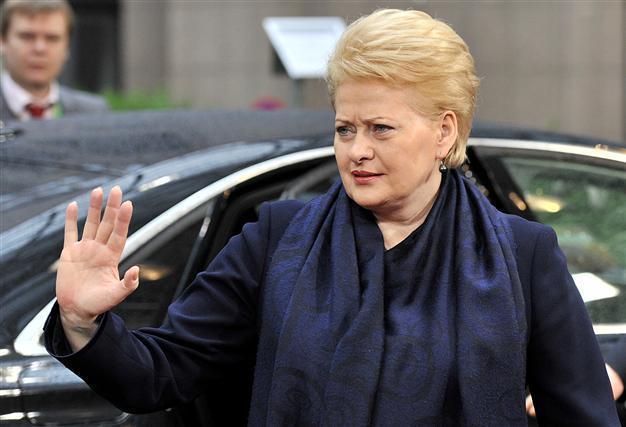Lithuania's 'Iron Lady' Grybauskaite poised for victory
VILNIUS - Agence France-Presse

Lithuania's President Dalia Grybauskaite is on course for reelection as the Baltic EU nation goes to the polls on May 11, 2014 amid frayed nerves over a resurgent Russia. AFP Photo
Lithuania's President Dalia Grybauskaite is on course for reelection as the Baltic EU nation goes to the polls Sunday amid frayed nerves over a resurgent Russia.Dubbed the "Iron Lady" for her Thatcheresque resolve, opinion surveys show she is a shoo-in for another five years as head of state.
However, analysts say low turnout could force a run-off coinciding with May 25 elections to the European Parliament.
The feisty 58-year-old has inspired voter confidence by clearly condemning Russia's actions in Ukraine.
She urged and then welcomed the arrival of American troops last month as NATO stepped up its presence in the Baltic states which spent five decades under Soviet occupation until 1991.
"A strong and unified European Union, capable of counterbalancing the imperial ambitions of Russia, is critically important for Lithuanian security," Grybauskaite said last week, as Lithuania marked a decade in both the EU and NATO.
Aurelija, a 36-year-old Vilnius businesswoman who declined to provide her family name, is impressed by Grybauskaite's "determination, courage and strength in the current situation" when national security has become a number one priority.
"In calm times, a hardline style could be annoying, but that is not the case now. Other candidates are weak opponents," she told AFP.
Grybauskaite, who has a black belt in martial arts, has also irked Moscow as a vocal advocate of stronger EU ties with Ukraine and other ex-Soviet states, notably Georgia and Moldova.
She played a key role in brokering an EU-Ukraine association deal that Kiev ultimately rejected at a November summit in Vilnius, sparking the mass protests that led to the ouster of pro-Russian president Viktor Yanukovych by February.
"She has given Lithuania a certain stature which is very important and she has put Lithuania definitely on the map," Judy Dempsey, an analyst at the Brussels-based Carnegie Europe think tank told AFP.
"She doesn't pull her punches, she speaks out, and she has an idea of what Lithuania's interests are," Dempsey added.
The former EU budget chief is also favoured for her economic prowess as her country gears up for eurozone membership next January.
Her experience means she is a good "judge of economic developments," Ignas Plikunas, a 27-year-old Vilnius voter, told AFP.
She broadly supported biting austerity measures when the global financial crisis hit Lithuania hard in 2009 and has endorsed Lithuania's first liquefied natural gas terminal intended to end the politically-tinged natural gas monopoly exercised by Russia's Gazprom.
Known for being fiercely independent, Grybauskaite has eschewed party politics but has won backing from the main opposition parties -- including conservatives and liberals -- which lost the 2012 general election to the governing Social Democrats.
"She is proud that she takes most decisions unilaterally. It is her fault that she lacks good advisers," Vilnius University analyst Kestutis Girnius told AFP.
Prime Minister Algirdas Butkevicius' decision against a presidential bid cemented her as the unchallenged leader in a field of seven candidates in the run up to Sunday's vote.
To score a round one victory, she must win half of the votes cast with a turnout of at least 50 percent.
"April surveys showed she would score 57 percent of votes in the first round. That would be enough given sufficient turnout," Vladas Gaidys, director of the independent Vilnius-based Vilmorus pollsters, told AFP.
He said different factors, from developments in Ukraine to weather conditions, could determine the outcome.
She would likely face Social Democrat member of European Parliament Zigmantas Balcytis or populist Labour party MP Arturas Paulauskas in a possible May 25 runoff.
Vowing to fight unemployment and tackle corruption, both have scored around 10 percent support in pre-election polls.
Born in Soviet-ruled Vilnius, Grybauskaite studied in the Russian city of Leningrad -- today's Saint Petersburg -- and also worked in a fur factory.
She later returned to Lithuania and taught economics at a Communist Party academy in Vilnius.
After independence in 1990 she became a senior civil servant and political aide responsible for building economic relations and negotiating Lithuania's membership in the EU.
Grybauskaite was deputy finance minister from 1999 to 2000, deputy foreign minister in 2000, and became finance minister from 2001 to 2004.
Lithuania nominated her to the Brussels-based European Commission when it joined the EU in 2004, where she served as budget chief until 2009. She won elections becoming president later the same year.
Grybauskaite, who is single, is fluent in English, Russian, Polish and French as well as her native Lithuanian.
















